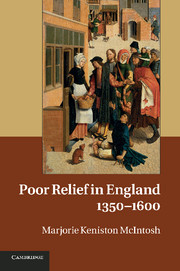Book contents
- Frontmatter
- Contents
- Acknowledgements
- Notes on conventions and online resources
- Abbreviations
- 1 Introduction
- Part I Late medieval and early Tudor patterns
- 2 Seeking alms
- 3 Late medieval hospitals and almshouses
- 4 Aid given through and by the parish
- Part II Profound change during the early Reformation period
- Part III Intensified problems and altered approaches in the later sixteenth century
- Part IV Responding to the problems
- Appendices included in the printed volume
2 - Seeking alms
Published online by Cambridge University Press: 05 January 2012
- Frontmatter
- Contents
- Acknowledgements
- Notes on conventions and online resources
- Abbreviations
- 1 Introduction
- Part I Late medieval and early Tudor patterns
- 2 Seeking alms
- 3 Late medieval hospitals and almshouses
- 4 Aid given through and by the parish
- Part II Profound change during the early Reformation period
- Part III Intensified problems and altered approaches in the later sixteenth century
- Part IV Responding to the problems
- Appendices included in the printed volume
Summary
Requesting charitable alms was the oldest and probably the most common method whereby poor people obtained aid in late medieval England. Because the Catholic Church taught that the poor were an integral component of society and that assisting them was a spiritual obligation, and because charitable giving contributed to the donor’s chances of salvation, especially when backed by an indulgence issued by church officials, asking for assistance and bestowing alms were accepted parts of life. Some people solicited help for themselves – in the form of money, food, clothing, or overnight lodging – while others gathered contributions for another individual or a charitable institution or project. The relatively low level of poverty between 1350 and at least the mid fifteenth century meant that informal charitable assistance was able to take care of the needs of many people struck by misfortune. Apart from some heated rhetorical statements and Parliamentary legislation about the mobile poor and beggars in the wake of the 1348–9 plague and the 1381 uprising, alms seekers do not appear to have created any particular anxiety, nor do we often hear about problems with fraudulent licenses.
The lay people who solicited alms may be placed into several categories. Some men and women sought help within their own communities, going to the doors of friends and neighbors to ask for aid. Most did so only occasionally, at times of special hardship, but a few relied regularly on the generosity of others. People who were unable to support themselves were allowed by statute to seek assistance privately within their own communities, and normally they were not punished even if they solicited alms in public places near their homes. A petition to Parliament probably from the 1510s was said to have been written by desperate poor people who were driven by necessity to beg, calling out for alms in churches and churchyards, fairs, and markets. Because some hospitals and most medieval almshouses did not provide full support, it was common for their residents to ask for donations from people who lived near the institution or traveled past it. The poor might also receive alms at funerals or commemorative services. Around 1500, as the problem of urban poverty began to mount, some of the larger towns and cities experimented with licensing certain residents to request charity publicly, a favored group often denoted by some sort of badge.
- Type
- Chapter
- Information
- Poor Relief in England, 1350–1600 , pp. 39 - 58Publisher: Cambridge University PressPrint publication year: 2011



